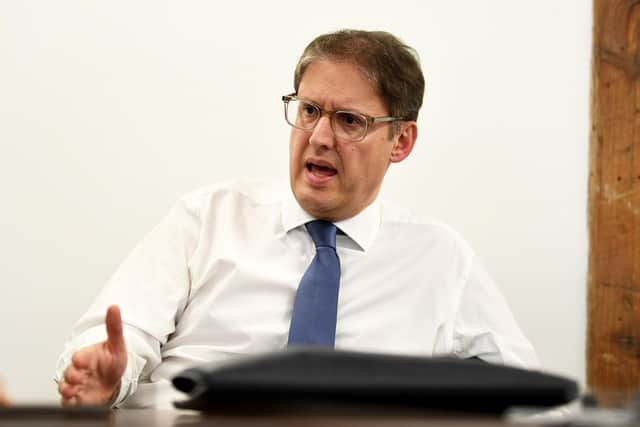Businesses halting investment plans due to chaos of Mini-Budget fallout, CBI boss Tony Danker reveals
Speaking exclusively to The Yorkshire Post in Leeds before the news broke that Chancellor Kwasi Kwarteng is being sacked, Mr Danker said the Government urgently needs to restore economic credibility.
"In the last week I’ve probably met with 100 to 150 business leaders,” he said.
Advertisement
Hide AdAdvertisement
Hide Ad"The message is unanimous – without macro-economic stability there is no growth.


"You can make taxes as low as you like but if you don’t have macroeconomic stability, you don’t have the markets calm – no one is going to invest.
"The overwhelming reality I have discovered this week is that a lot of businesses have lots of investments they want to do and certainly the bigger ones have the money they need to do them with. But they will not invest in this climate of uncertainty.”
When asked if investment plans are being put on hold specifically because of the market reaction to the Mini-Budget, Mr Danker said: “Yes.
Advertisement
Hide AdAdvertisement
Hide Ad"I have heard repeatedly this week, ‘We have investment plans, we have the money to fund them, we are putting them on hold because of this instability’.
"We’ve also heard from UK bosses of global firms that global HQs have put investment plans in the UK on hold until stability is restored.”
He added that he hoped this could be a short-term issue if there is a positive reaction to the October 31 announcement.
"Once stability is restored and a good set of supply-side reforms is added to them, their momentum for growth is back. I think people will move quickly on to deploy capital in plans they believe in.”
Advertisement
Hide AdAdvertisement
Hide AdBut he added that if there is a continued negative market reaction, “I think our members will continue to halt investment and the consequences for that on growth are clear”.
The Government has come under increasing pressure to ditch more of the planned £43bn of tax cuts contained within the Mini-Budget with a controversial move to reduce taxes for the nation’s highest earners already dropped.
The negative market fallout to the Mini-Budget resulted in the Bank of England launching a multi-billion emergency gilt-buying programme due to fears that the fallout from the Mini-Budget could lead to some UK pension schemes collapsing.
When Mr Kwarteng’s Mini-Budget was published on September 23, the CBI initially welcomed much of what it contained in terms of growth ambitions through policies such as planning system reform with Mr Danker describing it on the day as “a turning point for our economy”.
Advertisement
Hide AdAdvertisement
Hide AdAsked whether whether he regretted backing the Mini-Budget, Mr Danker said: “We were glowing about some of the supply-side reforms in the Mini-Budget and we remain glowing about some of the supply-side reforms in the Mini-Budget.
"The question is, will we get to them?”
Mr Danker said the CBI had held regular discussions with Mr Kwarteng about what measures are needed for growth prior to the Mini-Budget when the Chancellor was the Business Secretary.
He said while he was pleased to see some of the measures contained within the plan, “a lot of the Mini-Budget was a surprise to us”.
"It was our expectation that the Mini-Budget was going to be far more limited in scope than it was and that it was going to be a couple of tax reversals and the energy package.”
Advertisement
Hide AdAdvertisement
Hide AdMr Danker said to restore macroeconomic stability, the Chancellor and Prime Minister need to demonstrate “they take inflation, interest rates and medium-term debt deeply seriously”.
“Some people might say, is it really up to the markets? The answer is yes because we are borrowing to pay down £600bn of debt from the last two years. We have £450bn debt from the pandemic and £150bn debt and potentially rising from the energy intervention. So they are the bank manager and they want to know, do we have a credible plan to repay their lending? If you can’t answer that test, you don’t get to implement your supply-side reforms.”
Mr Danker said he believed it was still possible to turn around perceptions and restore credibility.
"I think the markets will absolutely respond to a restated plan and some restated clarity and reassurance. They wouldn’t be the first people who have seen a first business plan they didn’t like but liked a second one with feedback. None of this is politically desirable but I’m afraid that comes second to national economic stability and growth.
Advertisement
Hide AdAdvertisement
Hide Ad"Markets are dispassionate, they are not political pundits. They are lending money and want to hear a convincing plan from a convincing set of people behind the plan about how they are going to pay it back. That is a totally legitimate request. That space for ambiguity and cleverness has gone away. If it is a £60bn hole, how is it going to come down? They need to be very direct – does it need spending cuts, does it need tax rises? I’d be amazed if the answer was no.”
The Treasury was contacted for comment.